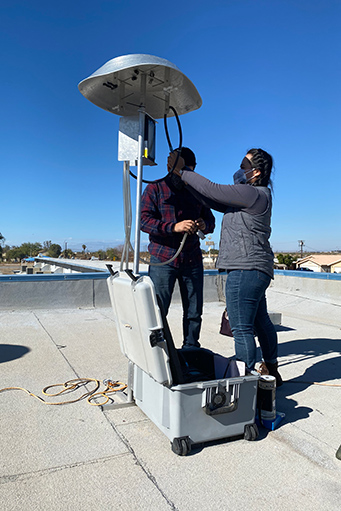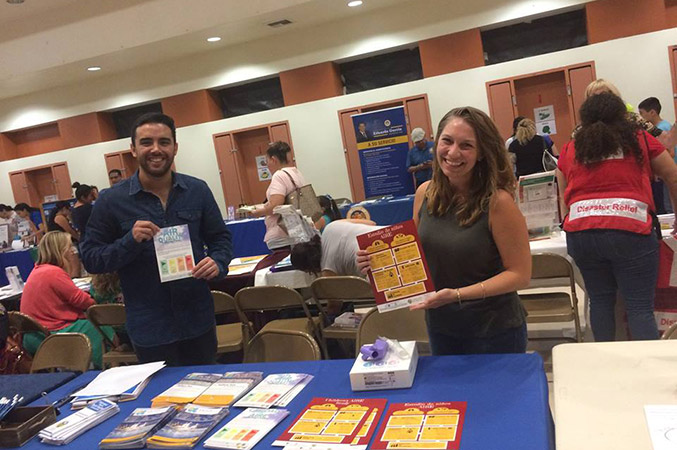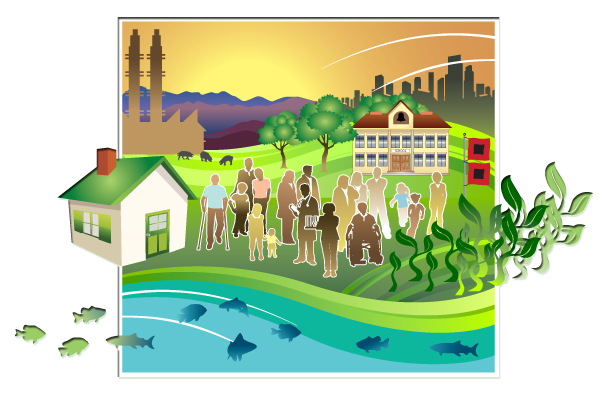Agricultural Burn Smoke Linked to Children’s Respiratory Health
Exposure to smoke from agricultural burns for as little as two weeks per year may worsen children’s respiratory health outcomes, a team of researchers and community partners found. The team, composed of researchers from the University of Southern California and community leaders from the Comité Civico del Valle, started the Children’s Assessing Imperial Valley Respiratory Health and the Environment (AIRE) study in response to community concerns about children’s respiratory health in Imperial Valley, a rural area in southern California. A July 2023 paper describes the AIRE cohort and how agricultural burning may be linked to wheezing and coughing in children.
Previous work in the Imperial Valley has looked at the effects of the shrinking Salton Sea on children’s health, but the AIRE cohort takes a wider look at how overall exposure to air pollution, including from agricultural sources, contributes to children’s health disparities in a region where asthma is prevalent.
“This is the first study in the U.S. to examine the effects of agricultural burning on children’s respiratory health,” stated Elizabeth Kamai, Ph.D., a researcher on the study. “Even though these burns are localized and don’t last very long, they can have a noticeable impact on nearby air quality. Our data supports the hypothesis that this source of air pollution can impact children’s health, especially for kids with asthma.”
“It is also an environmental justice issue because these children are adversely affected by asthma and other socioeconomic issues, including high rates of poverty, and they have this harmful environmental exposure on top of that,” stated Shohreh Farzan, Ph.D., lead researcher of the AIRE study.
Proximity to Agricultural Burning Linked to Children’s Breathing Problems

Yoshira Van Horne, Ph.D., former postdoctoral research associate at the University of Southern California, and Edgar Ruiz, of Comité Civico del Valle, set up an air monitoring system on the roof of an AIRE Study school site. (Photo courtesy of Shohreh Farzan)
Smoke from agricultural burning contains particulate matter that can have harmful effects on health. The Imperial Valley had 906 permitted agricultural burns from 2016 to 2019. These burns often occurred within several miles of schools and children’s homes, creating an environmental justice issue for the majority Hispanic region where 1 in 3 children live in poverty and 1 in 5 children have been diagnosed with asthma.
“Our work at Comité Civico del Valle aims to get to the heart of our community’s concerns, and a large portion of our work is directed toward addressing environmental health concerns,” said Luis Olmedo, executive director of Comité Civico del Valle. “Working with the research team on the AIRE study is an exciting project for us to find out more about what is going on with children’s respiratory health, and to get that information back in the hands of the community.”
Comité Civico del Valle’s connections with the community facilitated the relationship between the research team and local elementary school administrators who agreed to support the study. The team enrolled 708 first, second, and third grade students from five elementary schools across the region from 2017 to 2019. Parents were given surveys at the beginning of the study, and again twice a year for two years. The surveys asked parents to reflect on their children’s health over the past year, including asthma, respiratory symptoms such as wheezing or persistent cough, allergies, physical activity, and eye irritation.
Using the children’s addresses and records from agricultural burn permits, researchers determined how far each child lived from burn events and for how many days they were exposed to smoke from the burns. Analyzing this data in the context of the parents’ survey results, they found that children exposed to burns for the longest amount of time (4-13 days over the year) had significantly greater reported wheezing symptoms than children exposed to burns for 3 or fewer days. Researchers also determined that children with asthma exposed to smoke from burns had far greater reports of wheezing and sneezing than children with asthma who were not exposed to burns, supporting the idea that exposure to agricultural burns worsened asthma symptoms.
The research team developed a story map, which provides context for study results, such as details about agricultural burning and a map of burn locations relative to elementary schools.
Future Directions for the AIRE Study
The AIRE study emphasizes community engagement and reporting back results. Study partners have discussed results with residents and have developed communication materials to get information to the community.

Orangel Olmedo of Comité Civico del Valle and Farzan at a health fair at Westmorland Elementary School. (Photo courtesy of Shohreh Farzan)
The AIRE team also plans to establish an advocacy program to support community organizations and residents in addressing environmental health disparities. Agricultural burning is inexpensive, and farmers in Imperial Valley do not receive financial support from the state to transition to other methods for disposing of waste. Through advocacy, the partners hope to encourage farmers to use alternative methods that produce less particulate matter, such as tilling or mulching.
“We look forward to continuing to support the community with research that directly responds to their environmental health concerns,” added Farzan. “The partnership with Comité Civico del Valle has provided the opportunity to dive deep into environmental justice issues in the community and to support actions that can begin to address these concerns.”
Researchers Suggest Guidelines and Training to Bolster Report-Back Within Environmental Health Research Community
Two NIEHS-funded researchers published a commentary in December in the journal Environmental Health Perspectives on practical suggestions to increase report-back among environmental public health researchers. Suggested guidelines include:
- Specifying components of report-back plans and including such plans in relevant funding opportunities.
- Training for research teams, reviewers, and institutional review boards.
- Providing resources, such as a shared report-back infrastructure, while focusing on accessibility and equitability.
While the commentary does not specify who should develop these resources, the authors suggest federal funding agencies may be able to coordinate the resources’ development and implementation, as they have in other research areas such as human subjects’ protection. The authors also discuss why report-back is important, the unique concerns of report-back within environmental public health, and how report-back is used to drive action.
Sign Up for Environmental Justice Updates from the White House
The White House Council on Environmental Quality has an environmental justice email list. By signing up, you’ll get information on environmental justice news, funding notices, engagement opportunities, and webinars. The council, which was created in 1969, coordinates the federal effort to improve and protect the nation’s public health and environment.
2023 was Fifth Warmest Year on Record for U.S.
Last year was the fifth warmest year on record according to a 2023 U.S. climate data report released in January by the National Centers for Environmental Information of the National Oceanic and Atmospheric Administration. The report also includes information about notable climate disaster events. The U.S. experienced 28 weather and climate disasters in 2023 that each incurred losses in excess of $1 billion. The disasters included floods, tornadoes, storms, and other events. The report also highlights national data by type of event such as wildfires, tornadoes, and precipitation, and details regional data on temperature, precipitation, drought, and other notable weather. The National Oceanic and Atmospheric Administration publishes this report as part of its efforts to provide information to government, business, academia, and the public to support informed decision making. You can read highlights of the report or the whole report.
Special Journal Issue on Community-Engaged Research During COVID-19 Pandemic
The American Public Health Association, in collaboration with the NIH-funded Community Engagement Alliance (CEAL) network, released a special journal supplement about community-engaged research during the COVID-19 pandemic. The supplement has 25 editorials and papers that cover topics such as how to conduct effective community needs assessments, strategies for building and preserving community trust, and outreach and engagements strategies. The CEAL network works with communities and community organizations to promote health equity and strengthen community partnerships through community-engaged research.

PEPH Grantee Highlight
Andrew George, Ph.D.
Andrew George, Ph.D., is helping protect residents of North Carolina who rely on private wells from metal pollutants, such as arsenic, in well water. George is the community engagement coordinator at the University of North Carolina at Chapel Hill’s Center for Public Engagement with Science. By engaging communities in participatory science, he ensures communities have information about the health effects of metal exposures and resources for testing and treating well water. North Carolina has a lot of naturally occurring arsenic, which can leach into groundwater and invade wells. Arsenic can affect human health in different ways depending on the extent of exposure. A team of community partners, local government, and researchers, including George, conducted a study with well users and sent water filters and personalized report-back data to participants. In one town, residents used the data to ask the town government to connect their residences to municipal water lines, and the town council voted to support the project. George points out that residents using the research data to bring about long-term solutions is exactly the impact he hopes his work will have.
Funding Opportunities
Transformative Research to Address Health Disparities and Advance Health Equity (U01 Clinical Trial Optional)
Supports research on interventions addressing social determinants of health which would have a major impact on preventing, reducing, or eliminating health disparities and advancing health equity. Projects should clearly demonstrate a compelling potential to produce a major impact on advancing NIH’s commitment to addressing social determinants of health to accelerate progress in improving health for all. NIEHS is interested in innovative intervention research that addresses the interaction of social determinants of health with chemical and other environmental exposures that compromise health and contribute to health disparities. Note that this funding opportunity requires a Plan for Enhancing Diverse Perspectives, which will be assessed as part of the scientific and technical peer review evaluation. Projects must also document or demonstrate throughout the research process meaningful community partnerships to foster the development of feasible and acceptable approaches as well as acceptance, uptake, and sustainability of proposed interventions and strategies. A recording of the pre-application webinar is available.
Deadline: March 22, 2024
PHS 2023-2 Omnibus Solicitation of the NIH and CDC for Small Business Innovation Research Grant Applications (Parent SBIR [R43/R44] Clinical Trial Required)
Invites eligible United States small business concerns to submit Small Business Innovation Research (SBIR) Phase I, Phase II, Direct to Phase II (NIH only), Fast-Track (NIH only), and Phase IIB (NIH only) grant applications. The PHS 2023 -2 SBIR/STTR Program Descriptions and Research Topics for NIH, CDC, and FDA represent scientific program areas that may be of interest to applicant small businesses in the development of projects that have potential for commercialization. Small business concerns that have the research capabilities and technological expertise to contribute to the research and development mission(s) of the NIH and CDC awarding components identified in this funding opportunity are encouraged to submit SBIR grant applications in these areas. A related SBIR funding opportunity is available without a clinical trial requirement: PHS 2023-2 Omnibus Solicitation of the NIH, CDC and FDA for Small Business Innovation Research Grant Applications (Parent SBIR [R43/R44] Clinical Trial Not Allowed). Related funding opportunities are available for small business applicants interested in submitting small business technology transfer (STTR) applications: PHS 2023-2 Omnibus Solicitation of the NIH for Small Business Technology Transfer Grant Applications (Parent STTR [R41/R42] Clinical Trial Not Allowed) and PHS 2023-2 Omnibus Solicitation of the NIH for Small Business Technology Transfer Grant Applications (Parent STTR [R41/R42] Clinical Trial Required).
Deadline: April 5, 2024
SBIR/STTR Commercialization Readiness Pilot (CRP) Program Technical Assistance and Late Stage Development (SB1, Clinical Trial Not Allowed)
Encourages applications from small business concerns to the newly re-authorized Commercialization Readiness Pilot (CRP) program. The funding opportunity aims to facilitate the transition of previously or currently funded Small Business Innovation Research (SBIR) and Small Business Technology Transfer (STTR) Phase II and Phase IIB projects to the commercialization stage by providing additional support for technical assistance and later stage research and development not typically supported through Phase II or Phase IIB grants or contracts. This may include independent replication of key studies, Investigational New Drug-enabling studies, clinical studies, manufacturing costs, regulatory assistance, or a combination of services. Although a significant amount of the work in a CRP award may be subcontracted to other institutions, the small business concern is expected to maintain oversight and management of research and development throughout the award.
Deadline: April 5, 2024
Ruth L. Kirschstein National Research Service Award (NRSA) Individual Predoctoral Fellowship (Parent F31)
The Ruth L. Kirschstein NRSA Individual Predoctoral Fellowship (Parent F31) award enables promising predoctoral students to obtain individualized, mentored research training from outstanding faculty sponsors while conducting dissertation research in scientific health-related fields relevant to the missions of participating NIH Institutes and Centers. The proposed mentored research training must reflect the candidate’s dissertation research project and is expected to clearly enhance the individual’s potential to develop into a productive, independent research scientist. Funding opportunities are also open for the Ruth L. Kirschstein NRSA Individual Fellowship for Students at Institutions with NIH-Funded Institutional Predoctoral Dual-Degree Training Programs (Parent F30), which supports promising predoctoral students who are matriculated in a combined M.D./Ph.D. or other dual-doctoral degree training program, and who intend careers as physician/clinician-scientists; the Ruth L. Kirschstein NRSA Individual Senior Fellowship (Parent F33), which supports experienced scientists who wish to make major changes in the direction of their research careers or who wish to broaden their scientific background; the Ruth L. Kirschstein National Research Service Award (NRSA) Individual Fellowship for Students at Institutions Without NIH-Funded Institutional Predoctoral Dual-Degree Training Programs (Parent F30) to enhance the integrated research and clinical training of promising predoctoral students, who are matriculated in a combined M.D./Ph.D. or other dual-doctoral degree training program, and who intend careers as physician/clinician-scientists; the Ruth L. Kirschstein National Research Service Award (NRSA) Individual Postdoctoral Fellowship (Parent F32) to support research training of highly promising postdoctoral candidates who have the potential to become productive, independent investigators; and the Ruth L. Kirschstein National Research Service Award (NRSA) Individual Predoctoral Fellowship to Promote Diversity in Health-Related Research (F31-Diversity) to enhance the diversity of the health-related research workforce by supporting the research training of predoctoral students from diverse backgrounds.
Deadline: April 8, 2024
Notice of Special Interest (NOSI): Data Informed, Place-Based Community-Engaged Research to Advance Health Equity
This NOSI is meant to stimulate community-engaged research that leverages geospatial data to probe the influence of geographic factors on disease development and health outcomes. Its goal is to use place-based research to help advance health equity in different communities. Applicants must select the IC and associated NOFO to use for submission of an application in response to the NOSI. NIEHS is interested in applications that integrate place-based environmental data with other data types and sources (such as human behavior and time-activity patterns, environmental data collected by low-cost sensor networks or wearable technologies, biomonitoring data, and other molecular or clinical outcome data) to improve exposure estimates at both the community and individual level, to advance understanding of the effects of environmental exposures on health outcomes, and to inform prevention and intervention strategies. Applicants may apply through PA-20-185 or PA-20-195.
Deadlines: June 5, 2024; October 5, 2024
Intervention Research to Improve Native American Health (R01 Clinical Trial Optional)
Supports research on interventions to improve health in Native American populations, including:
- Etiologic research that will directly inform intervention development or adaptations.
- Research that develops, adapts, or tests interventions for health promotion, prevention, treatment, or recovery.
- Where a sufficient body of knowledge on intervention efficacy exists, research on dissemination and implementation that develops and tests strategies to overcome barriers to the adoption, integration, scale-up, and sustainability of effective interventions.
The inclusion of Native American investigators serving on the study team or as the program director or principal investigator is strongly encouraged. This funding opportunity is part of the Intervention Research to Improve Native American Health initiative, which also includes Intervention Research to Improve Native American Health (R21 Clinical Trials Optional), and Intervention Research to Improve Native American Health (R34 Clinical Trial Optional). For the R01 and R21 funding mechanisms, NIEHS is interested in applications that focus on the development, adaptation, efficacy, effectiveness, implementation, or sustainability of culturally appropriate interventions to prevent or mitigate the health impacts of environmental exposures that disproportionately impact Native American populations. For the R34 funding mechanism, NIEHS is interested in applications that support the initial development of a culturally appropriate clinical trial or research project in preparation for health promotion or disease prevention interventions addressing the health impacts of environmental exposures that impact Native American populations.
Deadline: October 1, 2024
Environmental and Climate Justice Community Change Grants Program
The Environmental Protection Agency (EPA) is accepting applications for its Environmental and Climate Justice Community Change Grants program. The program provides Inflation Reduction Act funds in environmental and climate justice activities to benefit disadvantaged communities through projects that reduce pollution, increase community climate resilience, and build community capacity to address environmental and climate justice challenges. These place-based investments will be focused on community-driven initiatives to be responsive to community and stakeholder input. The entities eligible to apply under this opportunity are:
- A partnership between two community-based nonprofit organizations.
- A partnership between a community-based nonprofit organization and one of the following:
- A federally recognized tribe.
- A local government.
- An institution of higher education.
Other organizations and entities may be able to participate and be involved in the Community Change Grants projects as collaborating subrecipients and/or procurement contractors selected in compliance with competition requirements. The EPA is accepting applications on a rolling basis; therefore, interested applicants are encouraged to apply early. To apply for this opportunity, see the announcement on Grants.gov.
Deadline: November 21, 2024
Upcoming PEPH-related Events
EPA Community Change Grants Technical Assistance Webinar: Community Plans, Engagement, Governance and Strength (webinar). Participants will learn about creating effective community-level plans and engagement models in the context of compliance in grant applications. This series of technical assistance webinars was started based on feedback from environmental justice leaders and communities about providing support for community partners in accessing federal resources. Other webinars in the series will occur March 12 and March 19. Registration for the March 5 webinar is available.
Society of Toxicology Annual Meeting (Salt Lake City, Utah). This conference will have oral scientific sessions, poster presentations, social events, and the ToxExpo, which features research organizations, government agencies, consulting firms, and academic institutions that support the toxicology community. Speakers will present on a range of environmental public health topics such as the health impacts of wildfire smoke, how wildfires affect susceptibility to respiratory disease, the use of geographical information to promote environmental justice, and findings on harmful algal blooms from the Oceans and Human Health Program, a joint effort of NIEHS and the National Science Foundation. Registration for the SOT meeting is available.
EPA Healthy and Resilient Communities Research Webinar Series: Social Systems and Justice in the Fifth U.S. National Climate Assessment (webinar). This webinar will cover how social systems contribute to the inequitable effects of climate change and influence communications about climate change. Speakers will also talk about climate justice in the context of equitable transitions to clean energy. The webinar is part of a series intended to help communities and local leaders reduce community vulnerabilities. The series is hosted by EPA’s Office of Research and Development. Registration for the March 12 EPA webinar is available.
National Environmental Health Association: Impact of Climate Change on Alaskan Natives (webinar). Speakers will talk about the environmental health impacts of climate change on Alaska Natives, such as food sovereignty, and how local organizations address these effects. Registration for the March 15 webinar is available.
Healthy People 2030: Planning for Individual and Community Health (webinar). Speakers from the Office of Disease Prevention and Health Promotion will speak about progress on four Healthy People 2030 objectives, including increasing the number of local jurisdictions and tribal communities that have a health improvement plan. The Healthy People 2030 initiative sets data-driven objective to improve health and well-being. Registration for the Healthy People 2030 webinar is available.
National Integrated Heat Health Information System National Meeting (virtual). The third annual meeting for the National Integrated Heat Health Information System will focus on engaging communities and developing a shared vision for community heat resilience. The meeting’s three themes are defining the problem of heat, personal exposure to heat, and community action and response to heat. The National Integrated Heat Health Information System is an interagency information system developed by the National Oceanic and Atmospheric Administration and the Centers for Disease Control and Prevention to provide actionable, science-based information to protect people from heat. Registration for the national meeting is available.
Air Sensors International Conference (ASIC): Advancing Science and Engaging Communities (Riverside, California). The conference will focus on how communities can better use air sensors to take action. ASIC invites participants from academia, government, communities, and commercial interests to share experiences and learn from and connect with others. Registration for the ASIC conference is open.
Association for Advancing Participatory Sciences: Conference for Advancing Participatory Sciences (online). This conference will include keynote presentations and panel discussions on topics related to participatory sciences. There will also be workshops and discussions focused on turning ideas into action and networking events. Registration will open in March.
National Environmental Health Association’s Annual Educational Conference and Exhibition (Pittsburgh, Pennsylvania and virtual). The conference will have more than 250 educational sessions on topics such as air quality and climate change. Registration for the NEHA conference (including single-day options) is available.







